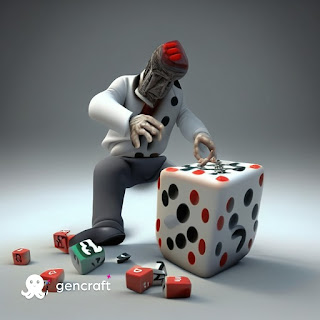Understanding the Illusion of Control
The illusion of control refers to the mistaken belief that individuals possess more influence over random events than they actually do. In the context of gambling, it manifests as the idea that one's actions, strategies, or rituals can sway the outcome of a game of chance. This illusion often leads individuals to overestimate their abilities and underestimate the role of luck, fostering a false sense of control.
Factors Contributing to the Illusion
Several factors contribute to the illusion of control in gambling. The first is the presence of skill-based games, such as poker or blackjack, where players can exert some level of influence on the outcome through decision-making and strategy. While skill certainly plays a role, chance and randomness remain significant determinants of success.
The second factor is the use of personal rituals or superstitious behaviors. Engaging in specific actions, such as blowing on dice or wearing a lucky charm, gives individuals a sense of control over the game's outcome. These rituals provide comfort and reinforce the illusion, despite having no logical influence on the results.
Negative Effects of the Illusion of Control
Financial Consequences:
The illusion of control can lead individuals to take excessive risks, overestimating their abilities and underestimating the role of chance. This can result in substantial financial losses, as individuals become convinced that their strategies will eventually lead to success. Consequently, they may engage in prolonged gambling sessions, chasing losses and falling into a cycle of debt.
Emotional Distress:
When the illusion of control is shattered by a series of losses, gamblers often experience heightened levels of frustration, anxiety, and disappointment. The disparity between their perceived control and the unpredictable nature of gambling can lead to emotional distress, affecting their overall well-being.
Escalation of Gambling Behavior: The illusion of control can also contribute to the development of gambling addiction. Believing they can master the game and regain control, individuals may become more obsessed with gambling, spending increasing amounts of time and money in pursuit of their elusive sense of control.
Overcoming the Illusion of Control
Recognizing and addressing the illusion of control is crucial for responsible gambling. Here are some strategies to overcome this deceptive belief:....
Education and Awareness:
Educating oneself about the true nature of gambling and the role of luck can help dispel the illusion of control. Understanding that outcomes are primarily governed by chance can aid in making more informed decisions.....
Setting Realistic Expectations:
Setting reasonable goals and understanding that gambling should be viewed as entertainment rather than a source of income can help in avoiding excessive risk-taking and financial ruin.....
Implementing Self-Control Measures: Setting limits on time and money spent gambling can prevent impulsive behavior and curb the illusion of control. Utilizing self-exclusion programs or seeking support from gambling helplines and support groups can be beneficial for those struggling with addiction.....
Conclusion
The illusion of control in gambling can be a seductive trap, leading individuals to believe they have more influence over outcomes than they actually do. The negative effects of this belief can be financially devastating and emotionally distressing. By understanding the true nature of gambling, setting realistic expectations, and implementing responsible gambling measures, individuals can safeguard themselves against.
Photo: Gencraft
